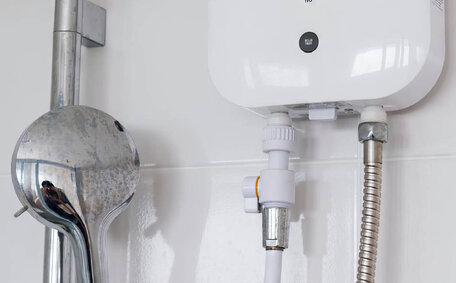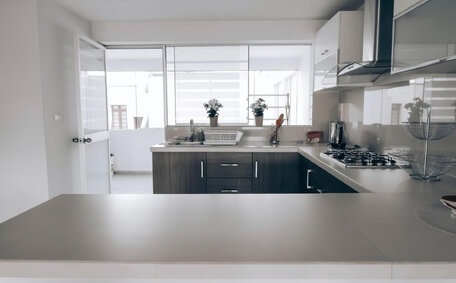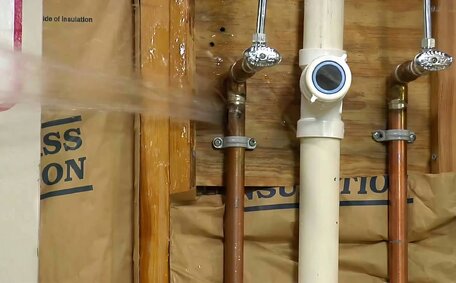Understanding Mould and Mildew Growth in Homes
Mould and mildew proliferate in damp conditions, releasing microscopic spores that land and germinate on surfaces. Common types such as Cladosporium, Aspergillus, Alternaria, and Penicillium thrive in humid environments within homes.
Mould inflicts harm on indoor spaces by fostering growth-conducive conditions. Poor ventilation and condensation can lead mold to thrive and spores to be released into the moisture-laden air in your damp indoor environment.
Leaky roofs, pipes, and faulty appliances can let mold into your home, saturating the air with moisture. Once mould begins to grow, it’s crucial to understand the disruption of environmental health by spore propagation. This can have an adverse effect on health, potentially causing asthma and allergies in residents.
Controlling moisture through effective ventilation, prompt leak repairs, and maintaining indoor humidity under 50% is critical to preventing mold and mildew. If mould is detected, it often stems from a plumbing problem which must be immediately addressed to facilitate its complete removal. Removing mould can be achieved by resolving the underlying moisture issue, including measures like pouring boiling water down the drain, to prevent recurrence.
How Plumbing Issues Contribute to Mould
Faulty bathroom plumbing is a leading cause of excess moisture, which often requires action to remove mould from homes. Leaks and drips from pipe drain systems can lead to conditions which may enable mould to grow, thereby damaging pipes, fittings, and appliances. Mold growth can begin rapidly, feeding on available food sources, and may emerge in as little as 48 hours when moisture and humidity levels remain elevated.
Mould and mildew problems often stem from complex plumbing issues affecting your water supply, including:
- Dripping faucets, a scenario often caused by leaking taps, pipes, and water heaters
- Clogged drains and gutters causing backups
- Leaking roofs damaged from plumbing vent stack leaks
- Appliance leaks like dishwashers, washing machines, and refrigerators
- Condensation and moisture under sinks due to missing or inadequate insulation
Upon detecting mould, mildew, dampness, plumbing leaks, or musty odours, promptly engage your local plumber to inspect and resolve these issues, safeguarding your plumbing system. Unattended, this can result in mildew and mould swiftly spreading, posing a significant health risk with infestations within wall cavities and under flooring.
To address plumbing leaks, your plumber can improve bathroom ventilation, ensure drains are clear, and check that areas prone to moisture, like under sinks, are properly sealed. Maintaining moisture control through proactive maintenance can forestall future hazardous mold growth.
Health Risks of Mould Exposure
Be proactive in combating mildew and dampness, particularly in homes with residents who have respiratory conditions that could worsen due to mould, as advised by local health authorities. Even minimal amounts of mold can incite allergic reactions, asthma episodes, and other adverse health impacts.
Potential health effects include:
- Coughing, wheezing, difficulty breathing
- Runny nose, sinus congestion
- Eye, nose and throat irritation
- Headaches, fatigue
- Rashes, hives
People with weakened immune systems or chronic respiratory conditions like COPD are particularly susceptible to the harmful effects of mould. Prolonged exposure can lead to serious health consequences, jeopardising health your and overall wellbeing.
Babies, young children, older adults, pregnant women, and those recovering from illness should particularly avoid inhaling mould to prevent potential health problems. One should seek medical attention for severe or lingering symptoms, especially difficulty breathing, wheezing, or headaches.
Signs of a Mould Problem
There are several telltale signs that may indicate a mould issue in your home:
- Visible growth: Be vigilant for fuzzy or powdery black, green, yellow, or white spots on walls, ceilings, window frames, and near plumbing, as they indicate mildew growth.
- Musty, earthy smell: Noticeable mildew damp, particularly originating from mould bathroom conditions, as well as dampness in basements and crawl spaces.
- Prolonged dampness: Consistently moist walls, floors or carpets are signs of water damage or pooled water.
How do I identify troublesome mould? If you observe dark stains that reappear even after cleaning, peeling paint or soft, rotting spots in drywall or wood, this likely indicates excess moisture and mould growth happening behind these surfaces.
Discover more about how to react when suspecting concealed leaks or drainage problems by engaging an emergency plumber immediately, who can easily address excessive dampness permitting unrestrained mould growth. Ventilation issues in kitchens, bathrooms and laundry rooms also require prompt maintenance to improve air flow and reduce humidity.
Finding yourself pondering, 'How do I tackle mould issues in my abode?' is common when confronting the threat of severe mould damage; Nonetheless, the right strategies can prevent this type of damage. Arrange a plumbing inspection at the initial indication of mould risk to stop spores from dispersing through HVAC systems and affecting the entire home.
How Plumbers Address Mould Issues
When plumbers are called to address mould problems, what a plumber do includes identifying and rectifying the root cause – the source of excess moisture compromising your home’s environment. An experienced plumber will conduct a thorough inspection to check your home’s plumbing system and pinpoint issues.
During the inspection, in many cases, your plumbing is checked for condensation, leaks, drainage backups and other signs of water damage. Usual troublesome areas, inclusive of water heaters, taps, and pipes, can create the perfect breeding ground for mould. The plumber also evaluates the condition of drywall, floors and ceilings, ensuring no water has trickled down inside the affected area of your walls causing mould damage.
Once the source of moisture your plumber identifies is secured, the leak is stopped and the area is dried out entirely. Then, ensuring all times to maintain safety, contaminated materials like drywall are removed and substituted. Your plumber can also employ their expertise in product treatment to extract water from carpets and padding with advanced commercial drying systems.
Repairs are pivotal in restoring proper plumbing function and mitigating dampness in living spaces. Your plumber may replace fittings or sections of old, cracked pipes and improve bathroom fans and ventilation. Taking these steps prevents excess moisture that allows hazardous mould regrowth.
For mould prevention, plumbers also provide maintenance like drain cleaning, leak detection, pipe insulation installation and humidistat adjustments. Proactive servicing caters to all your plumbing needs, utilising advanced treatments to keep moisture at bay, ensuring superb air quality and defending your dwelling from decay and mould.
Preventing Future Mould Growth
There are several effective ways to help prevent mould growth in the future:
- Control indoor humidity to prevent mould by using exhaust fans, opening windows to ensure good ventilation, and maintaining humidity levels between 30-50%.
- Promptly fix any water leaks or moisture issues to stop any mould from taking hold - never overlook even small leaks or dampness.
- Consistently clean and sanitise moist areas – consider using a mixture of white vinegar and baking soda to inhibit mould growth before it establishes.
- Improve drainage and grading - Ensure gutters, downspouts and ground slopes move water down drain away from your home’s foundation.
- Insulate cold water pipes and windows - Reduces cold surface condensation which contributes moisture.
- Use mould-resistant building materials - Choose materials like tile, metal, vinyl, concrete, glass and certain plastics when renovating.
- Schedule annual plumbing inspections - Detect issues early before mould problems start. Fix cracks, leaks, and improve ventilation.
Seek professional assistance and adhere to best practices in moisture control and diligent plumbing maintenance to sustain a mould-free residence. Collaborating with a professional plumber ensures timely maintenance and leak repairs as necessary.
Maintaining Good Ventilation
Proper ventilation is paramount for controlling moisture, thereby preventing the growth of hazardous mould and mildew. Increase airflow and reduce humidity by:
- Ensuring bath and kitchen exhaust fans are used regularly, especially when showering or cooking, to conduct moisture outside your home and prevent buildup
- Opening windows periodically for fresh air circulation
- After use, leave the shower curtain and bathroom door open to facilitate moisture evaporation from areas like shower walls
- Ensure that vents are not blocked by furniture or belongings to maintain efficient air circulation.
- Cleaning mould and dirt buildup around vents regularly
- Having your HVAC system serviced to ensure proper moisture removal
- Installing dehumidifiers to maintain 30-50% relative humidity
- Upgrading to ENERGY STAR exhaust fans when replacing old models
Maintaining quality ventilation assists in preventing an indoor environment mould might find hospitable due to excessive moisture. Partner with your plumber to optimise moisture control.
Regular Inspections and Maintenance
Routine inspections and maintenance by a professional plumber are crucial to identify and remediate minor issues before they escalate into major moisture and mould problems.
Valuing our professional expertise, we recommend regular plumbing assessments to meticulously survey concealed pipes, fixtures, and drains, thus preventing potential damage to your property. Experienced plumbers have the expertise and tools to detect early leaks, clogs or ventilation issues in areas difficult for homeowners to access, like wall cavities, under sinks and roof spaces.
During maintenance visits, comprehensive plumbing services include several mould prevention measures, such as:
- Clearing biofilm and sediment buildup in drains
- Replacing old pipes and fittings prone to cracking
- Sealing areas vulnerable to moisture like under sinks
- Insulating cold water pipes to reduce condensation
- Optimising humidity levels and testing humidistats
- Enhancing your bathroom and kitchen ventilation as needed
Utilising infrared cameras and moisture meters, we pinpoint excess moisture conducive to mould growth during inspections. Through proactive plumbing maintenance, we stop problems before mould takes hold.
Do not delay action until mold becomes visible or detectable by smell. Ignoring minor leaks can result in decay, potential mould hazards, and deteriorating air quality. Partnering with Bexley Plumbing provides the vigilant service needed to protect your home.
When to Call a Professional
We recommend you contact professional mould remediation experts if you discover extensive contamination, structural damage, or particularly hazardous varieties like black mould. Attempting DIY solutions can worsen the problem and pose health risks.
Signals that prompt the question 'what do I do when faced with mould?' and indicate the need for professional assessment and remediation include:
- Visible mould over 30 square feet
- Significant water damage or dampness behind walls and under materials
- Recurring mould growth despite cleaning efforts
- Mould growing for more than 48 hours unchecked
- Sensitivity symptoms like breathing difficulty, headaches, rashes
To manage substantial infestations or intricate moisture dilemmas, your local plumber possesses the skills to help identify and tackle what makes mould a pressing issue. We use protective gear such as rubber gloves and a face mask, alongside commercial-grade products, to thoroughly clean, dry and decontaminate your home while fixing plumbing problems safely.






